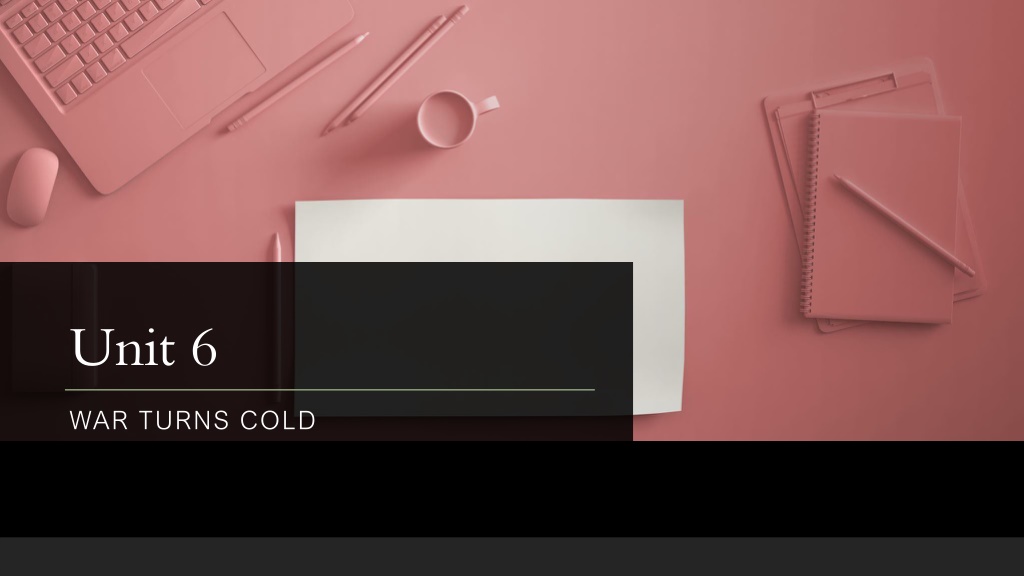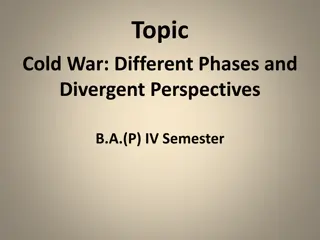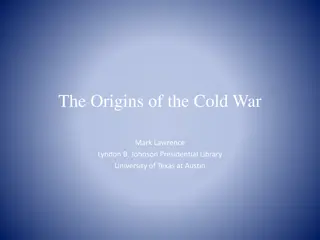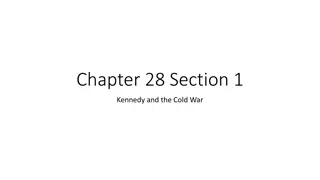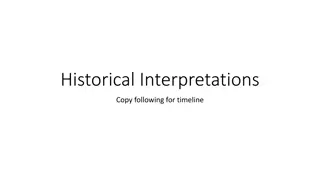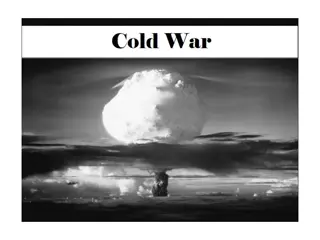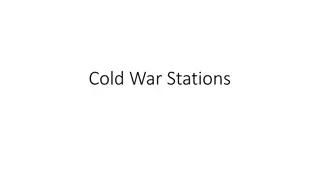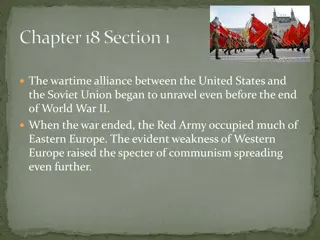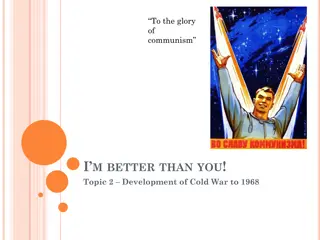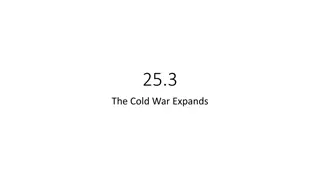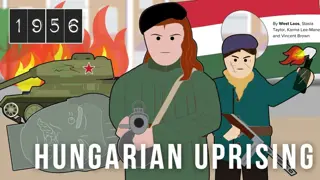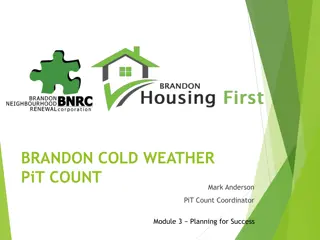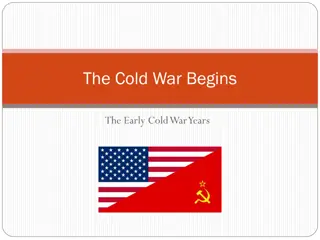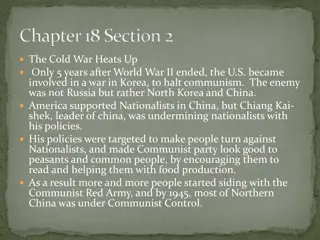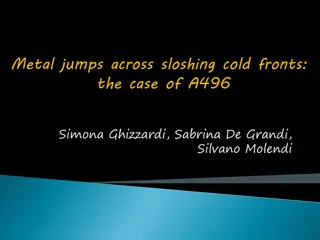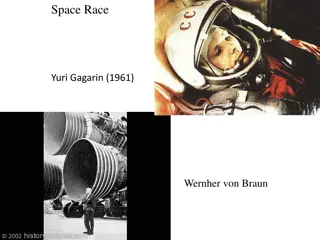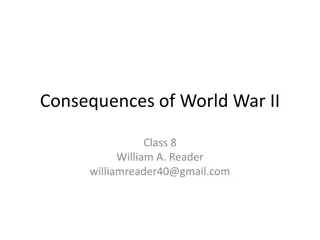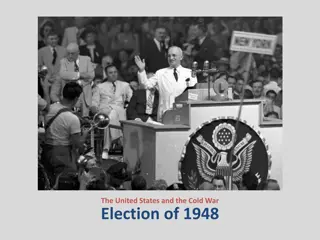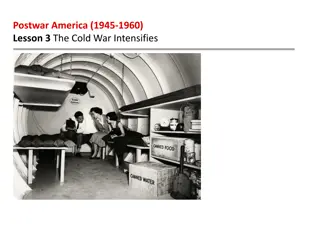Understanding the Cold War: Origins, Consequences, and Ideological Conflicts
Explore the origins, consequences, and ideological conflicts of the Cold War through key events like the Iron Curtain, Berlin Airlift, Korean War, and Cuban Missile Crisis. Learn about communism, democracy, and the impact of beliefs and ideals on attempts to stop the spread of communism during this pivotal period in history.
Download Presentation

Please find below an Image/Link to download the presentation.
The content on the website is provided AS IS for your information and personal use only. It may not be sold, licensed, or shared on other websites without obtaining consent from the author. Download presentation by click this link. If you encounter any issues during the download, it is possible that the publisher has removed the file from their server.
E N D
Presentation Transcript
Unit 6 WAR TURNS COLD
Standards: SS5H5 Discuss the origins and consequences of the Cold War. SS5H5 Discuss the origins and consequences of the Cold War. a. Explain the origin and meaning of the term Iron Curtain. b. Explain how the United States sought to stop the spread of communism through the Berlin airlift, the Korean War, and the North Atlantic Treaty Organization. c. Identify Joseph McCarthy and Nikita Khrushchev. d. Discuss the importance of the Cuban Missile Crisis and the Vietnam War.
Learning Target(s) SS5H5 SS5H5 I can discuss the origins and consequences of the Cold War.
Compelling/Driving Question How did the beliefs and ideals of the U.S. How did the beliefs and ideals of the U.S. affect its decisions to attempt to stop the affect its decisions to attempt to stop the spread of communism? spread of communism?
Vocabulary Origin Iron Curtain Communism airlift NATO Missile Crisis Democracy Republic Consequences
The Iron Curtain Iron Curtain is a term used in the West to refer to the boundary line which divided Europe into two separate areas of political influence from the end of World War II until the end of the Cold War.
Communism The basic idea of communism is that a country s government controls everything. Individual people cannot own property by themselves because everything is shared everything is shared. The goal is to try to make life fair and equal for everyone. The poor and weak are treated the same as the rich treated the same as the rich. In fact, in communism, there are no rich people because everyone is considered equal. poor and weak are
Communism Confusion and Conflict: Confusion and Conflict: Some people believed in this ideal so much and others wanted to literally rule the world, this led to conflict.
What is Communism?
Entrance Ticket: Nikita Khrushchev Nikita Khrushchev Directions: View the video and answer the question. On the back of the paper restate the question and write your answer in one sentence using the R.A.C.E strategy. R.A.C.E Which of the following is associated with Nikita Khrushchev's leadership of the Soviet Union? A. a commitment to the protection of human rights and minorities B. the use of force to maintain control over Soviet satellite states C. modernization of the Soviet economy through the expansion of private property rights D. democratic reforms that allowed the Soviet people greater access to the political process http://www.ovovideo.com/en/nikita-khrushchev/
Cold War The Cold War was an ongoing political rivalry between the United States and the Soviet Union the Soviet Union and their respective allies that developed after World War II. This hostility between the two superpowers was first given its name by George Orwell in an article published in 1945.Feb 3, 2020 United States Combatants: Soviet Union; United States Location(s): United States
Exit Ticket Which two countries emerged as global superpowers after the Which two countries emerged as global superpowers after the end of World War II? end of World War II? A. China and Japan A. China and Japan B. West Germany and Hungary B. West Germany and Hungary C. the United Kingdom and France C. the United Kingdom and France D. the Soviet Union and the United States D. the Soviet Union and the United States
Entrance Ticket How did the Twenty How did the Twenty- -fourth Amendment change voting rights in the United fourth Amendment change voting rights in the United States? States? A. It prohibited the use of fees as a barrier to casting a vote. A. It prohibited the use of fees as a barrier to casting a vote. B. It permitted citizens to cast their votes for president directly. B. It permitted citizens to cast their votes for president directly. C. It allowed citizens to cast their votes by mail when away from home C. It allowed citizens to cast their votes by mail when away from home D. It affirmed that the right to vote cannot be denied on the basis of race. D. It affirmed that the right to vote cannot be denied on the basis of race.
